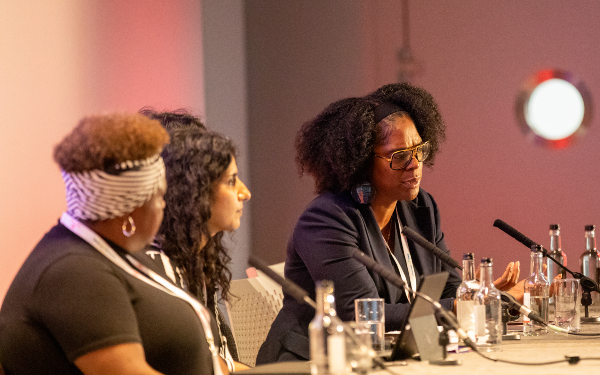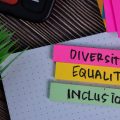
By Rob Preston and Mithran Samuel
Senior leadership buy-in is critical to tackling racism in social work, Community Care Live heard last week.
In the wake of campaigns and activism from students and practitioners against racism in the profession over the past year, British Association of Social Workers anti-racism lead Shantel Thomas said that, while these could have an impact, “it has to start from the top”.
“The local authority does need to buy into it. Do they want to become an anti-racist organisation, is this something that is their priority, is this something that they actually want to do? Senior leaders have to have the mindset of understanding that they actually want to do this.
“It is something that has to be more front and centre. It has to form part of any team meeting or conversation.”
Thomas was speaking on a panel alongside Social Work England’s head of equality, diversity and inclusion, Ahmina Akhtar, and Millie Kerr, anti-racist lead practitioner at Brighton & Hove Council.
Articles on social work and race
- Black and ethnic minority workers three times as likely to fail ASYE as white colleagues, figures show
- ‘It’s right to focus on race, but we must look at equality in social work in the round’
- Black children’s social workers more positive about work environment than colleagues, finds survey for DfE
- Black and ethnic minority social workers disproportionately subject to fitness to practise investigations
- How does social work regulation perpetuate institutional racism?
Kerr, whose role is believed to be the only dedicated anti-racist social worker role among English local authorities, also emphasised the importance of senior leadership buy-in.
She said that in Brighton & Hove, senior leaders had undertaken training in anti-racism workbook Me and White Supremacy, by Layla Saad, and this was now being rolled out to team managers before being extended to social workers.
Though this training was technically voluntary, Kerr said it was “indirectly compulsory” because senior leaders had bought into it.
Impact of anti-racist practitioner
Kerr discussed some of the impacts her role had had within Brighton & Hove, including having racism discussed in supervision and performance development plans and her providing mentoring for black, Asian or ethnic minority staff. In some cases, she said, this had involved persuading staff not to leave the organisation.
Brighton is also one of 18 councils trialling the workforce race equality standard for social care (WRES), initiated by the government’s chief social workers, and involving authorities assessing themselves against a range of indicators on race. These include:
- The percentage of staff from an ethnic minority at each pay band compared with representation in the wider workforce.
- The comparative rates of ethnic minority staff entering the formal disciplinary and fitness to practise processes.
- The comparative rates of staff from an ethnic minority staff experiencing bullying, harassment or abuse from people who use social care, relatives or the public, colleagues or managers.
- Comparative rate of ethnic minority staff leaving the organisation in the past year.
- The comparative rate of staff from an ethnic minority being shortlisted for roles.
Initial results from the WRES are due to be released shortly, as are the outcomes of a survey of social workers’ experience of racism in the workplace. This was carried out by the Anti-Racist Social Work Steering Group, which comprises Social Work England, What Works for Children’s Social Care and the two prinicpal social worker networks.
Akhtar said this was part of efforts to fill a data gap in relation to race in the profession, which also includes Social Work England’s request for practitioners to fill out equality and diversity information when renewing their registration this autumn.
Disproportionate fitness to practice referral rate
An example of the data gap concerns the disproportionate number of referrals of black and ethnic minority practitioners to the fitness to practise system, which the regulator reported in July 2020. At that point, it said the data it had was not precise and that it did not have information on what happened to practitioners from ethnic minorities within the fitness to practise system.
Akhtar confirmed that the data in this area was still “anecdotal” and needed to be more robust.
It was also revealed last year that the panels that heard fitness to practise cases were disproportionately white relative to the composition of the profession. Akhtar told Community Care Live that the regulator was taking steps to recruit more diverse panels, including by ensuring job descriptions did not wrongly deter people from applying.
‘Clumsy conversations’
She said it was important to bring people with you in tackling racism in the workplace, in the context of a fear of talking about it.
“One of the things we’ve done at Social Work England is introduce something called ‘clumsy conversations’. It means people have a way of engaging that allows them to get things wrong and not feel judged. I think there’s something about psychological safety that feels really important.
“I think there is something in people who are quite skilled in one area of work but might not have that confidence in other areas. Sometimes that can be really difficult to experience that cognitive dissonance. We need to have the commitment that Shantel talked about and what’s the best way of bringing people along with us.”




 Bournemouth, Christchurch and Poole
Bournemouth, Christchurch and Poole  Hampshire County Council
Hampshire County Council  Lincolnshire County Council
Lincolnshire County Council  Norfolk County Council
Norfolk County Council  Northamptonshire Children’s Trust
Northamptonshire Children’s Trust  South Gloucestershire Council
South Gloucestershire Council  Wiltshire Council
Wiltshire Council  Wokingham Borough Council
Wokingham Borough Council  Children and young people with SEND are ‘valued and prioritised’ in Wiltshire, find inspectors
Children and young people with SEND are ‘valued and prioritised’ in Wiltshire, find inspectors  How specialist refugee teams benefit young people and social workers
How specialist refugee teams benefit young people and social workers  Podcast: returning to social work after becoming a first-time parent
Podcast: returning to social work after becoming a first-time parent  Podcast: would you work for an inadequate-rated service?
Podcast: would you work for an inadequate-rated service?  Family help: one local authority’s experience of the model
Family help: one local authority’s experience of the model  Workforce Insights – showcasing a selection of the sector’s top recruiters
Workforce Insights – showcasing a selection of the sector’s top recruiters 

 Facebook
Facebook X
X LinkedIn
LinkedIn Instagram
Instagram
I was at this CC Live panel discussion. It was refreshing to have 3 social workers speakers who were all women from BME backgrounds. They were all good. Although, the dreadlocked anti-racism visionary was missed!
‘Clumsy conversations’ doesn’t seem particularly mindful or sensitive to me. It could easily be mistaken as a mandate for careless microaggressions and thoughtlessness. Yes have a safe space for honest discussions, but there must still be expectations and boundaries.
And with this evidence of race disparities in social work practice, SWE continues to appoint an all white board with no Black face? It’s high time all Black social workers boycott or write a petition to SWE for meaningful change on equal representation. There are so many highly qualified & experienced black social workers. SWE is going against all tenets of social work, equality, diversity & social justice. SWE should be exemplary on these issues.
Given that the social work profession is such a poor reflection of the community it serves in terms of the over all ratio of female to male staff, is it too much to expect it to also be able to address OTHER areas of diversity and equality with any degree of effectiveness?
Wait your turn in the hierarchy of the mistreated. It might be a long time coming though.
No.
I agree with Pandora Mohan about SWE. It was created mainly as a vision by David Cameron and other right wing politicians to “scrutinise” social workers and micro-manage them. This is exactly what the changes made recently are about – choosing groups of social workers to “monitor” and inspect their CPD, moving into different regions, generally over-scrutinising social workers in my opinion. But, as I pointed out to them in my response to their consultation, they took a very long time after George Floyd’s death before employing Shantal Thomas. They started operating in December 2019. What was the preparation done before then to address race equality? Why did SWE not reply to Wayne Reid’s regular letters and emails to them continually asking them to tell him what they were doing about race equality? I certainly don’t have much trust in SWE. I need to see some actions on race equality not just hot air, vague policy statements and delays.
I have no time for SWE but they aren’t obliged to respond to every question, tweet and letter are they? Presumably BASW gets the answers when they have their regular cosy chats with SWE? With biscuits thrown in?
In 1981 I was employed as a “Social Work Race Advisor” by a London council social work department. I was trumpeted as being so essential that I even had a photo taken with the Mayor and Leader of the Council. I had my own office too! Ten years after I left it would have been hard to guess whether I was the more disappointed or the extremely committed social workers who wanted genuine justice based change that never happened. Big launches of “Race Informed” training, “culturally appropriate” advisors on adoption panels, equality and bias training for interview panellists and more made just a tiny dent. It could be that I was the wrong person for the task and lacked the skills and awareness to drive changes and make a real impact. Or that for all of its headline aspirations, the council then and our profession still lack the committment to change cultures that stereotype workers and users of services. So in solidarity I hope Millie Kerr doesn’t find herself marginalised, slightly patronised and doesn’t get shunted into a slot as the ‘expert’ who has all the solutions and is the sole navigator of the paths. Given the treatment of refuse collectors by Brighton and Hove council I am not sure fairness and equity is a priority of her employers though.
Yes Nikki, I would be interested in knowing what BASW talks to SWE about too.
I am a black female social worker’ late 50’s who, along with many other experienced workers loves social work but we are so disillusioned with the inequalities.
Also people who become ‘self appointed’ team managers without any specific training. Unfortunately some of them turn out to be incompetent bigots.
Put simply, ain’t never going to change in my time which means the revolving door of social workers leaving continues.
We have a national shortage.
No one ever seems to talk about the impact on vulnerable children and families when support and protection is just not available?
It’s diabolical that in 2021we continue to have these futile discussions:-( (clumsy or not).
The bottom line is at the root of this issue is inequality born out people who think they are superior to others who happen to be ‘different’ to them whether it be class, gender, disability or ethnicity!